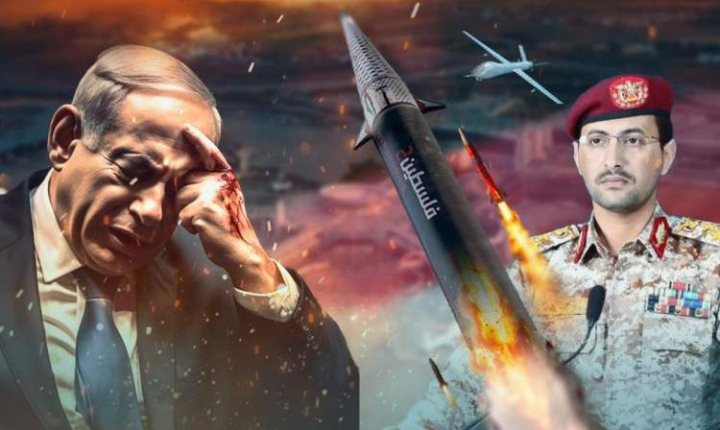Yemen at the Heart of the Battle: Strikes Shake the Zionist Entity as the Spirit of the September 21 Revolution Redefines the Rules of Deterrence
Were it not for the September 21 Revolution, Yemen would not be standing today at the forefront of the free peoples of the world—confronting global arrogance and imposing new deterrence equations on the Zionist enemy. This blessed popular revolution, which liberated Yemen’s political decision from American and Saudi domination, has reshaped the nation’s identity—transforming it from a country under tutelage into a formidable regional power fighting alongside Palestine in a battle for existence.
Amid the ongoing U.S.-Israeli aggression on Gaza, Yemen’s revolutionary role—both politically and militarily—has emerged as one of the most powerful acts of practical solidarity in an era of Arab betrayal. Through exceptional, targeted operations that have reached deep into the Zionist entity and vital enemy interests in the Red Sea, Yemen has asserted that the new Yemen—of revolution and sovereignty—is firmly present in the heart of the nation’s battle. Gaza is not alone.
The Red Sea Under Full Yemeni Control
A Russian military publication has reported that Yemeni naval forces have defeated Western powers—led by the United States—in the Red Sea theater.
According to Voyennoe Obozrenie, the Red Sea is now completely devoid of U.S. warships for the first time in decades. The report confirms that Yemeni naval forces have established full control over this global artery, forcing Western fleets to retreat after sustaining painful Yemeni strikes.
The report notes that maritime traffic has dropped by 60% in areas under Yemeni control—highlighting the economic toll of Yemen’s blockade on vessels tied to the Zionist entity. In this naval battle, Yemenis have shattered Western arrogance, reducing enemy ships to stationary targets in their line of fire.
The failure extends beyond Washington, as the European Union has also failed to secure maritime navigation. This inability has led to a sharp 60% reduction in shipping activity—a stark indicator of Yemen’s growing impact on this critical maritime corridor and the global economy.
The geopolitical implications are profound: Yemen is asserting its will over one of the world’s most vital shipping lanes—challenging even the most powerful nations.
Over 1,700 Strategic Operations—Deterrence in Full Force
Military expert Brigadier General Ali Abi Raad confirmed that Yemen has carried out over 1,700 military operations since the beginning of the Al-Aqsa Flood campaign. These include ballistic missiles, drones, and naval assaults targeting deep into the Zionist entity—reaching Be’er Sheva, Ashkelon, Hadera, and even Eilat (Umm Al-Rashrash).
Abi Raad stated that the Zionist entity is suffering from strategic paralysis due to Yemeni attacks, despite U.S. and British support. He emphasized that Yemeni deterrence is now an unignorable reality—forcing the enemy to reckon with a new rule: “There will be no security as long as your aggression continues.”
He further revealed that Yemen possesses hypersonic precision missiles capable of striking sensitive sites within the entity, including command centers, nuclear facilities, and military bases.
When the Cybersecurity Capital Became a Legitimate Target
Military analyst Brigadier General Abdulghani Al-Zubaidi emphasized that Yemen’s operations are far from random. Be’er Sheva, for instance—one of the most sensitive areas in the entity due to its military bases, security centers, and proximity (30 km) to the Dimona nuclear reactor—was deliberately targeted. Be’er Sheva also serves as the Zionist regime’s cybersecurity capital.
The geographical spread of Yemeni strikes—from Hadera in the north to Eilat in the south—demonstrates that half of the entity’s territory is now within range of Yemeni fire. Al-Zubaidi warned that any foolish Zionist provocation could trigger a devastating Yemeni response, targeting command centers, ports, and the regime’s vital infrastructure.
Popular Support Matches Military Momentum
Al-Zubaidi also pointed out that millions who took to the streets in Sana’a and other provinces have voiced unwavering support for Gaza, granting full authorization to the political and military leadership to escalate further. This massive popular backing is a second front—no less effective than missiles and drones—demonstrating internal cohesion and Yemen’s emergence as a living strategic depth for the resistance.
Yemeni Escalation Unstoppable—Arab Complicity Irrelevant
Yemeni analyst Ali Al-Dailami affirmed that escalation is ongoing and intensifying. New tactical options are already on the table, ready to be activated if aggression on Gaza continues.
Al-Dailami condemned the complicit Arab regimes, accusing some of indirectly obstructing Yemeni operations through joint U.S.-Israeli intelligence coordination.
“We face a moral paradox,” he said. “Arab states export technology to the enemy while shedding crocodile tears for Gaza’s children. Meanwhile, Yemen—under siege—fires back in defense of Palestine, imposing new deterrence equations on the Zionist entity.”
Yemen’s Revolution: A Heart in Gaza, a Missile in Tel Aviv
The question is no longer “Where is Yemen?” but “When and where will Yemen strike next?” This nation, liberated by the September 21 Revolution from foreign domination, has redefined its historical role—rising to fight on behalf of the silent and opening a new front the enemy never expected.
This is the revolution that made Sana’a closer to Gaza than Cairo, Riyadh, or Amman, and positioned Yemen not as a voice of condemnation—but as a military actor in the resistance, wielding missiles, drones, and a sovereignty earned through blood and sacrifice.
Yemen Shifts the Balance of the Conflict
What’s happening today is not a series of scattered operations—but a major strategic shift in the Arab-Israeli conflict. Yemen now plays a decisive role, driven by conviction, a resilient people, and a revolutionary leadership armed with vision and courage to help reshape the future of the region.
Yemen is no longer seeking a role—it is creating roles. It stands shoulder-to-shoulder with Palestine, expecting neither reward nor recognition—only that the banner of truth is raised over Al-Aqsa, the siege on Gaza is broken, and the spine of Zionist and imperial tyranny is crushed.

